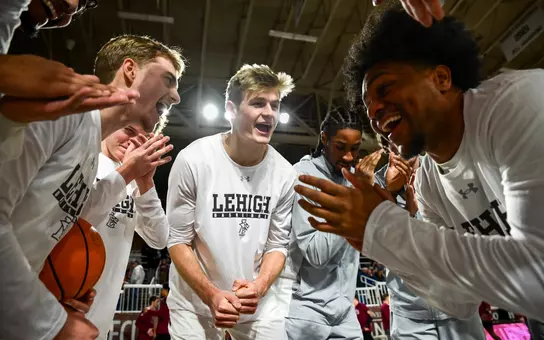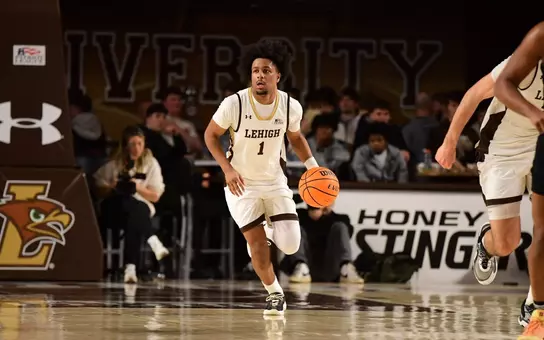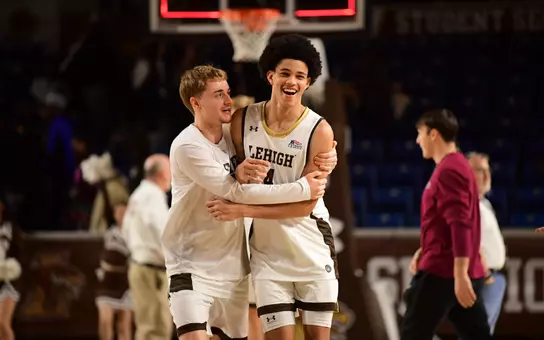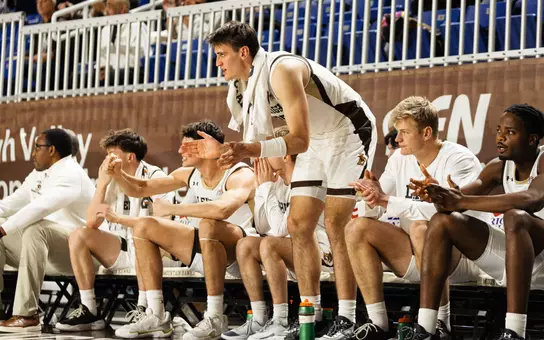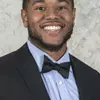Lehigh University Athletics
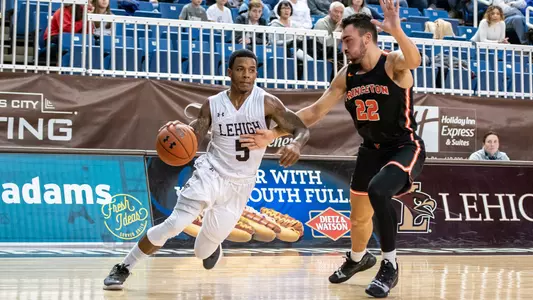
Lance Tejada Finds Himself at Home
1/24/2019 6:46:00 PM | Men's Basketball, Student Athlete, Features, Intellectual Development
By: Justin Lafleur, Lehigh Sports Communications
On the surface, Lance Tejada is a successful college basketball player who almost always has a smile on his face. But deep down, Tejada has gone through struggles and hardships that very few people know about.
Tejada's journey has taken him to a number of schools and living situations, but today, Lance is enjoying plenty of success. It took time and an adjustment, but there's no doubt LT has found a "home" at Lehigh.
"At Lehigh, I realized I had support because people actually asked me how I felt outside of basketball, especially Coach Reed, Coach Wyche and all my teammates who would check in on me and send me texts," said Tejada. "I didn't have that anywhere I had been. People at Lehigh genuinely care."
Today, Tejada still faces day-to-day hardships, as everyone does, but he is in a good place and wants to share his story. He hopes by doing so, it empowers others to do the same.
Growing Up Quickly
One of the first things Tejada knew as a youngster was basketball.
"Funny story… my dad actually brought a basketball to the hospital the day I was born," said Lance. "From when I can remember life, basketball was a part of it. My grandfather was a coach. I was always around sports and basketball."

Although Tejada enjoyed basketball, Lance describes playing the sport as of more of a business.
"It was always competitive for me, since second grade," he said. "We were traveling for tournaments every weekend. Basketball has pretty much been my identity from a young age."
Growing up, Tejada's living situation wasn't stable.
"Now, my parents are cordial, but for a long time, they really didn't get along," said Tejada. "I moved a lot when I was a kid. I don't really remember too many places I stayed; that's how much I moved."
Originally from the Bronx, Tejada admittedly didn't do much outside of school and sports. Living in New York and having more responsibilities than the normal child his age, Tejada was forced to grow up quickly, which is both good and bad.
"I was taking transit, the train or the bus since third grade," he said. "I had to adapt to my environment really young. It taught me to always watch my surroundings because you never knew what was going to happen in New York City…
"But from what I can remember, growing up in New York made me the person I am today."

During his time in New York, Tejada was most focused on getting through the day.
"Not that I didn't receive love, but as long as we were taken care of and we had a roof over our heads and we had food to eat, we were satisfied," he said. "That's how I psychologically started to view life."
Tejada grew very close with his grandparents and eventually found himself in the same household as them, moving to Florida at the age of 12.
"When we moved to Florida, we all lived in the same house – my dad and my grandparents," said Tejada. "My grandparents' house was probably the happiest place. My grandparents played a huge role in my life."
Flash forward a few years. When time came for an important decision in his life – his college decision – Tejada actually connected with Lehigh before deciding on East Carolina.
"I visited ECU and was going to visit Lehigh the week after," he said. "[Lehigh assistant] Coach Wyche and I have had a great relationship since high school. He even told me before the visit to not fall in love, commit and not give us a try. He gave me that rundown."
But what did Lance do?
"I committed on my visit to ECU," he said. "A lot of that commitment was honestly just the younger side of me. You don't really look things through for the long run and the bigger picture.
"I made a young decision."
Hard Times
On the court, Tejada was contributing at ECU. It may not have been to the extent he wanted, but he was seeing time (33 games as a freshman and 31 as a sophomore).

However, on the inside, Tejada was struggling.
"The first time I knew I had a form of depression was around my second year at East Carolina," he said. "I just realized I wasn't happy, but it wasn't just your normal unhappy. My mind told me certain things about myself and it was hard to control, to the point where I would lash out. I would go in my room and just throw things around. I have never told this to anybody [before now].
"I would go to my room and want the world to end."
At the time, Tejada's identity was almost solely basketball, making him question things about himself.
"That's who Lance Tejada was, this basketball player," he said. "That's how I was raised, that's how my mind was shaped and I didn't really know who I was as a person. So if I had a bad game or felt like I wasn't taking care of business on the court, I felt like less of a person off the court."
As Tejada said, he "faded away from the world."
"I didn't want to be around anybody. I was super lonely and knew I was really depressed when my mom came to one of my games. I played well. I had something like 14 points in 15 minutes and we had dinner at Red Lobster. I remember vividly sitting down and her only question was, how are you? Forget about basketball. How have you been?"
How did Lance respond?
"I just broke down and started crying… in Red Lobster," he said. "I had a decent game, but it didn't fill that void I was feeling. I still didn't really feel much, and that's how I knew there was a problem."
Tejada knew he had to speak with someone.
"I don't really like calling it depression, but rather trials and tribulations," he said. "That's my term for it because I feel like the stigma behind mental health is the reason why a lot of athletes don't talk about it. There are famous athletes, people who you'd never expect to be going through problems, and people who seem so happy – especially with social media – but they're really the loneliest people in the world.
"Everybody has a story," Tejada continued. "Everybody has things that they're very insecure about. Things they've been through that nobody knows, but eats at them inside."
Coming To Lehigh, Hardship Hits
Tejada essentially needed a "reset," so he decided to transfer from East Carolina. Immediately, Lehigh came back to the forefront.

"I wanted to go somewhere I felt cherished," he said. "I wanted to go somewhere they were interested to know who LT was, on and off the court. I couldn't pass up a Lehigh degree. I took a visit, but in my mind, I knew I was committing. I'm not going to say I owed it to them, but knew that God was telling me this was the right place."
Lehigh head coach Brett Reed was impressed by his conversations with Tejada.
"Lance and I had some really candid conversations over the phone and what really impressed me was his openness in talking about everything… and it was full disclosure," said Reed. "He showed great self-awareness by understanding the areas where he could improve and how he would engage differently in the process, and also circumstances that he had dealt with throughout the course of his life that got him to that moment in time.
"But what I really sensed was he needed a home," Reed continued. "He needed a place where people cared about him. We had the understanding that it wasn't going to be easy, but I believed in him. This was someone I really wanted to succeed, not just as a basketball player, but also as a person. His candor and openness with me, and the willingness to embrace in a really authentic relationship with an adult, was something that's unique for a young man at that stage in his life."
Early in his time at Lehigh, Tejada struggled to adjust. What added to the struggles was his grandfather – who you may remember he was very close to – passed away.

"I hit rock bottom again and realized I really had to talk to somebody because I was losing it," said Lance. "I was here at Lehigh, couldn't play basketball (not being able to play in games due to NCAA transfer rules) and was very uncomfortable to be honest.
"Lehigh is a great place, don't get me wrong, but it was a culture shock for me," he continued. "At first, I felt even more alone here. And I really didn't know how to go about my day-to-day life because everything I learned from basketball came from my grandfather, who was my first coach."
To this day, Lance lives with his grandmother and cousins. Being so close to his grandfather made his death that much tougher.
"My grandparents have been my parents in a sense, as far as two people who are together raising children," said Tejada. "That was the power couple right there. Losing him, it made me realize how short life really is and to cherish the people you love."
After a childhood that featured minimal affection, Tejada found himself very introspective, keeping things to himself. His grandfather passing away helped change things.
"I started expressing myself more because I never really told people how much they meant to me," said Lance. "My grandfather was a marine and a very hard-nosed guy, but was very soft with me on the inside because I was his first grandson and was someone he was proud of. He was a basketball fanatic, so he and I grew real close, especially over the later years of his life. Losing him was by far the worst pain I've felt."
Tejada needed time to grieve, and he knew his Lehigh teammates (and coaches) were always there for him.
"Other athletes will be able to relate with not wanting to talk about sports 24/7 because I was going through real-life situations and real emotions," he said. "I didn't even care about basketball. I was at practice the day my grandfather passed away. I still had to be there, but mentally, I was everywhere. It wasn't healthy, and it showed. I would lose it a little bit or emotionally, I'd be all over the place and would pour everything on the court, even if it was bad emotions. It was anger, it was hurt. I had to talk more and get my problems out."
That's exactly what Tejada did, and continues to do to this day.
"Just getting everything I had inside off my chest helped," he said. "Especially males, you grow up holding a lot in. People are dealing with hurt, stress and trauma that they go through and they're not willing to speak up because they're scared. People are scared of being vulnerable."
Being Vulnerable Helps Heal
Tejada always cared deeply for his parents, and has always appreciated everything they have meant to him.
"My mom and I honestly didn't get close until I was older, and a lot was because of my parents' relationship," said Lance. "She would come around birthdays and holidays. She tried her hardest. My parents were going through a lot at the time. She tried to be there as best she could, but it's also hard to develop a relationship with someone you're not really around."
As the years have passed, Tejada has gained more and more perspective, and doesn't hold any bitterness. In fact, it's quite the opposite.
"My mom did the best she could," said Tejada. "She chased her dreams and aspirations, but we weren't really close until four years ago. Now, we're really close. She's my best friend.
"I just had to do a lot of healing."

How did Lance heal?
"I told her everything I felt," he said. "And she had no idea what I felt growing up. Just speaking about it and letting her understand where I'm coming from allowed me to heal. After that, I saw a big change in our relationship because she started making strides to help me heal, repair and make up for lost time. She moved to New Jersey, so I see her a lot now. It's been great."
Tejada is also extremely appreciative of everything his father has done for him. He wouldn't be where he is today without his father.
"My dad was a college coach for a long time and he still coaches today," said Lance. "I went to his practices a lot growing up. I remember running around the park after him. He played an essential part to me playing basketball and loving basketball. He played a big role in my life, being there for me.
"Even though it wasn't the most stable situation with my parents as a unit, my dad did everything he could to make sure we had shelter and food on our table."
Another Reminder
Tejada faced more hardship last year when his friend Reuel Buchanan passed away.

"He got hit by a car while jogging, literally by his house just getting a workout in," said Tejada. "He would go in a room and put a smile on everybody's face. I wanted to be like him. He was a criminal justice major, an honor roll student who went to the University of Central Florida. Doing everything right.
"It really taught me to cherish the people close to you, tell somebody you love them and tell somebody you care about them."
During another tough time, Tejada felt more "ready" to deal with tragedy, due in large part to learning to express himself and not keep all his emotions bottled up.
"I just wish I could have one more conversation with him," said Tejada. "But everything happens for a reason and I've continued to open up more. Now, I've been making it a habit to call people… call people I might not have talked to in two weeks. We spend so much time on our phones, on Instagram and looking at other people's lives, but we don't really value and reach out to people who we love."
Thriving at Lehigh
For all the hardships Tejada has faced, he is thriving at Lehigh. In his first season on the court for the Mountain Hawks, Lance led Lehigh in scoring (14.7 points per game) and earned second team All-Patriot League honors. He has developed into one of the nation's best three-point shooters, which includes a school-record tying 10 threes (on 14 attempts) earlier this season at Holy Cross
Why was Lehigh been the right fit for LT?
"Lehigh is the first place I can say I felt 'wanted' from a collective community," he said. "I have fans who tweet me and just tell me how much I mean to them, and it's been more of a family here – especially with my coaches and how they were there for me during those tough times, how they allowed me to grow in those situations and not look down at me when I told them certain things I was going through. They didn't belittle the situation and they were there for me as father figures and brother figures."
One of Tejada's new "brothers" is fellow senior Kyle Leufroy.
"I just try to let LT, and everyone on the team know, that I want our relationship to go beyond basketball," said Leufroy. "I care for each and everybody, so I want them to know I'm here for them whenever and whatever it may be."
Tejada has shown tremendous growth since childhood, especially over the last few years at Lehigh. A lot of it is Tejada, while he also credits those around him at Lehigh for helping him get to this point.
"LT today is a completely different LT from when he first stepped on campus," said Leufroy. "You want to applaud him for the transition he's made. Just working on himself every single day, I definitely want to give him credit for that and just understanding this is a journey. Coming to college forces people to grow up through the experiences they go through. He is completely different from when he first came on campus, from a social aspect (being more open with people) to how he carries himself on the court."

While he's thriving on the court, Tejada is also well on his way to earning his academic degree from a prestigious institution.
"I wanted to make a decision for basketball, but also for my long-term journey," said Tejada. "Getting one of the top degrees you're probably going to find, why turn that down? Lehigh had a winning basketball culture, great coaches and a really cool team that I got along with as soon as I got here.
"Lehigh wasn't missing anything."
Takeaways
Tejada isn't looking for sympathy, but hopes his story can help. He hopes people become more open and not afraid to ask for help.
"I've learned that time heals all wounds," said Tejada. "Don't hold all those emotions inside. There's help out there. You're not the only one going through it. You might be surprised that the person next to you who seems the happiest may be going through a lot.
"Don't be afraid to express your emotions because it does feel better. And know that your life is precious. Everything happens for a reason and don't be afraid of being stigmatized and not saying what you really feel, even if you don't understand it. A lot of what I feel and have felt, I can't explain… and that's what's frustrating.
"If you don't feel comfortable talking to somebody close to you, there is professional help. A real person that you can talk to and cry with and figure out how to solve these problems."
As his coach, Reed couldn't be more proud of Tejada's courage in stepping forward to tell his story.
"For Lance to talk openly and candidly about the things going on in his life, the challenges he has and the dreams that he has for his future, it shows a lot of courage," said Reed. "For him to be able to give glimpses and insights of some things that have gone well and some things that haven't gone well for him, it's a great reminder for anyone that deals with issues or has down days, that there is hope.

"There is a great opportunity for the next day, the opportunity to do the next right thing, the opportunity to reframe your perspective, to learn a little bit about yourself and go through those challenges and grow.
"Lance is a huge success story."
Tejada's journey has taken him to a number of schools and living situations, but Lance Tejada has come out stronger in the end.
"I didn't want to do this interview. Deep down, I did not want to do it," he said. "I had to be vulnerable and tell people what I've been through. But it's therapeutic for me. After, I feel good about myself because I took that step.
"When you're most uncomfortable, I feel like those are the most beautiful moments of your life."
On the surface, Lance Tejada is a successful college basketball player who almost always has a smile on his face. But deep down, Tejada has gone through struggles and hardships that very few people know about.
Tejada's journey has taken him to a number of schools and living situations, but today, Lance is enjoying plenty of success. It took time and an adjustment, but there's no doubt LT has found a "home" at Lehigh.
"At Lehigh, I realized I had support because people actually asked me how I felt outside of basketball, especially Coach Reed, Coach Wyche and all my teammates who would check in on me and send me texts," said Tejada. "I didn't have that anywhere I had been. People at Lehigh genuinely care."
Today, Tejada still faces day-to-day hardships, as everyone does, but he is in a good place and wants to share his story. He hopes by doing so, it empowers others to do the same.
Growing Up Quickly
One of the first things Tejada knew as a youngster was basketball.
"Funny story… my dad actually brought a basketball to the hospital the day I was born," said Lance. "From when I can remember life, basketball was a part of it. My grandfather was a coach. I was always around sports and basketball."

Although Tejada enjoyed basketball, Lance describes playing the sport as of more of a business.
"It was always competitive for me, since second grade," he said. "We were traveling for tournaments every weekend. Basketball has pretty much been my identity from a young age."
Growing up, Tejada's living situation wasn't stable.
"Now, my parents are cordial, but for a long time, they really didn't get along," said Tejada. "I moved a lot when I was a kid. I don't really remember too many places I stayed; that's how much I moved."
Originally from the Bronx, Tejada admittedly didn't do much outside of school and sports. Living in New York and having more responsibilities than the normal child his age, Tejada was forced to grow up quickly, which is both good and bad.
"I was taking transit, the train or the bus since third grade," he said. "I had to adapt to my environment really young. It taught me to always watch my surroundings because you never knew what was going to happen in New York City…
"But from what I can remember, growing up in New York made me the person I am today."

During his time in New York, Tejada was most focused on getting through the day.
"Not that I didn't receive love, but as long as we were taken care of and we had a roof over our heads and we had food to eat, we were satisfied," he said. "That's how I psychologically started to view life."
Tejada grew very close with his grandparents and eventually found himself in the same household as them, moving to Florida at the age of 12.
"When we moved to Florida, we all lived in the same house – my dad and my grandparents," said Tejada. "My grandparents' house was probably the happiest place. My grandparents played a huge role in my life."
Flash forward a few years. When time came for an important decision in his life – his college decision – Tejada actually connected with Lehigh before deciding on East Carolina.
"I visited ECU and was going to visit Lehigh the week after," he said. "[Lehigh assistant] Coach Wyche and I have had a great relationship since high school. He even told me before the visit to not fall in love, commit and not give us a try. He gave me that rundown."
But what did Lance do?
"I committed on my visit to ECU," he said. "A lot of that commitment was honestly just the younger side of me. You don't really look things through for the long run and the bigger picture.
"I made a young decision."
Hard Times
On the court, Tejada was contributing at ECU. It may not have been to the extent he wanted, but he was seeing time (33 games as a freshman and 31 as a sophomore).

However, on the inside, Tejada was struggling.
"The first time I knew I had a form of depression was around my second year at East Carolina," he said. "I just realized I wasn't happy, but it wasn't just your normal unhappy. My mind told me certain things about myself and it was hard to control, to the point where I would lash out. I would go in my room and just throw things around. I have never told this to anybody [before now].
"I would go to my room and want the world to end."
At the time, Tejada's identity was almost solely basketball, making him question things about himself.
"That's who Lance Tejada was, this basketball player," he said. "That's how I was raised, that's how my mind was shaped and I didn't really know who I was as a person. So if I had a bad game or felt like I wasn't taking care of business on the court, I felt like less of a person off the court."
As Tejada said, he "faded away from the world."
"I didn't want to be around anybody. I was super lonely and knew I was really depressed when my mom came to one of my games. I played well. I had something like 14 points in 15 minutes and we had dinner at Red Lobster. I remember vividly sitting down and her only question was, how are you? Forget about basketball. How have you been?"
How did Lance respond?
"I just broke down and started crying… in Red Lobster," he said. "I had a decent game, but it didn't fill that void I was feeling. I still didn't really feel much, and that's how I knew there was a problem."
Tejada knew he had to speak with someone.
"I don't really like calling it depression, but rather trials and tribulations," he said. "That's my term for it because I feel like the stigma behind mental health is the reason why a lot of athletes don't talk about it. There are famous athletes, people who you'd never expect to be going through problems, and people who seem so happy – especially with social media – but they're really the loneliest people in the world.
"Everybody has a story," Tejada continued. "Everybody has things that they're very insecure about. Things they've been through that nobody knows, but eats at them inside."
Coming To Lehigh, Hardship Hits
Tejada essentially needed a "reset," so he decided to transfer from East Carolina. Immediately, Lehigh came back to the forefront.

"I wanted to go somewhere I felt cherished," he said. "I wanted to go somewhere they were interested to know who LT was, on and off the court. I couldn't pass up a Lehigh degree. I took a visit, but in my mind, I knew I was committing. I'm not going to say I owed it to them, but knew that God was telling me this was the right place."
Lehigh head coach Brett Reed was impressed by his conversations with Tejada.
"Lance and I had some really candid conversations over the phone and what really impressed me was his openness in talking about everything… and it was full disclosure," said Reed. "He showed great self-awareness by understanding the areas where he could improve and how he would engage differently in the process, and also circumstances that he had dealt with throughout the course of his life that got him to that moment in time.
"But what I really sensed was he needed a home," Reed continued. "He needed a place where people cared about him. We had the understanding that it wasn't going to be easy, but I believed in him. This was someone I really wanted to succeed, not just as a basketball player, but also as a person. His candor and openness with me, and the willingness to embrace in a really authentic relationship with an adult, was something that's unique for a young man at that stage in his life."
Early in his time at Lehigh, Tejada struggled to adjust. What added to the struggles was his grandfather – who you may remember he was very close to – passed away.

"I hit rock bottom again and realized I really had to talk to somebody because I was losing it," said Lance. "I was here at Lehigh, couldn't play basketball (not being able to play in games due to NCAA transfer rules) and was very uncomfortable to be honest.
"Lehigh is a great place, don't get me wrong, but it was a culture shock for me," he continued. "At first, I felt even more alone here. And I really didn't know how to go about my day-to-day life because everything I learned from basketball came from my grandfather, who was my first coach."
To this day, Lance lives with his grandmother and cousins. Being so close to his grandfather made his death that much tougher.
"My grandparents have been my parents in a sense, as far as two people who are together raising children," said Tejada. "That was the power couple right there. Losing him, it made me realize how short life really is and to cherish the people you love."
After a childhood that featured minimal affection, Tejada found himself very introspective, keeping things to himself. His grandfather passing away helped change things.
"I started expressing myself more because I never really told people how much they meant to me," said Lance. "My grandfather was a marine and a very hard-nosed guy, but was very soft with me on the inside because I was his first grandson and was someone he was proud of. He was a basketball fanatic, so he and I grew real close, especially over the later years of his life. Losing him was by far the worst pain I've felt."
Tejada needed time to grieve, and he knew his Lehigh teammates (and coaches) were always there for him.
"Other athletes will be able to relate with not wanting to talk about sports 24/7 because I was going through real-life situations and real emotions," he said. "I didn't even care about basketball. I was at practice the day my grandfather passed away. I still had to be there, but mentally, I was everywhere. It wasn't healthy, and it showed. I would lose it a little bit or emotionally, I'd be all over the place and would pour everything on the court, even if it was bad emotions. It was anger, it was hurt. I had to talk more and get my problems out."
That's exactly what Tejada did, and continues to do to this day.
"Just getting everything I had inside off my chest helped," he said. "Especially males, you grow up holding a lot in. People are dealing with hurt, stress and trauma that they go through and they're not willing to speak up because they're scared. People are scared of being vulnerable."
Being Vulnerable Helps Heal
Tejada always cared deeply for his parents, and has always appreciated everything they have meant to him.
"My mom and I honestly didn't get close until I was older, and a lot was because of my parents' relationship," said Lance. "She would come around birthdays and holidays. She tried her hardest. My parents were going through a lot at the time. She tried to be there as best she could, but it's also hard to develop a relationship with someone you're not really around."
As the years have passed, Tejada has gained more and more perspective, and doesn't hold any bitterness. In fact, it's quite the opposite.
"My mom did the best she could," said Tejada. "She chased her dreams and aspirations, but we weren't really close until four years ago. Now, we're really close. She's my best friend.
"I just had to do a lot of healing."

How did Lance heal?
"I told her everything I felt," he said. "And she had no idea what I felt growing up. Just speaking about it and letting her understand where I'm coming from allowed me to heal. After that, I saw a big change in our relationship because she started making strides to help me heal, repair and make up for lost time. She moved to New Jersey, so I see her a lot now. It's been great."
Tejada is also extremely appreciative of everything his father has done for him. He wouldn't be where he is today without his father.
"My dad was a college coach for a long time and he still coaches today," said Lance. "I went to his practices a lot growing up. I remember running around the park after him. He played an essential part to me playing basketball and loving basketball. He played a big role in my life, being there for me.
"Even though it wasn't the most stable situation with my parents as a unit, my dad did everything he could to make sure we had shelter and food on our table."
Another Reminder
Tejada faced more hardship last year when his friend Reuel Buchanan passed away.

"He got hit by a car while jogging, literally by his house just getting a workout in," said Tejada. "He would go in a room and put a smile on everybody's face. I wanted to be like him. He was a criminal justice major, an honor roll student who went to the University of Central Florida. Doing everything right.
"It really taught me to cherish the people close to you, tell somebody you love them and tell somebody you care about them."
During another tough time, Tejada felt more "ready" to deal with tragedy, due in large part to learning to express himself and not keep all his emotions bottled up.
"I just wish I could have one more conversation with him," said Tejada. "But everything happens for a reason and I've continued to open up more. Now, I've been making it a habit to call people… call people I might not have talked to in two weeks. We spend so much time on our phones, on Instagram and looking at other people's lives, but we don't really value and reach out to people who we love."
Thriving at Lehigh
For all the hardships Tejada has faced, he is thriving at Lehigh. In his first season on the court for the Mountain Hawks, Lance led Lehigh in scoring (14.7 points per game) and earned second team All-Patriot League honors. He has developed into one of the nation's best three-point shooters, which includes a school-record tying 10 threes (on 14 attempts) earlier this season at Holy Cross
Why was Lehigh been the right fit for LT?
"Lehigh is the first place I can say I felt 'wanted' from a collective community," he said. "I have fans who tweet me and just tell me how much I mean to them, and it's been more of a family here – especially with my coaches and how they were there for me during those tough times, how they allowed me to grow in those situations and not look down at me when I told them certain things I was going through. They didn't belittle the situation and they were there for me as father figures and brother figures."
One of Tejada's new "brothers" is fellow senior Kyle Leufroy.
"I just try to let LT, and everyone on the team know, that I want our relationship to go beyond basketball," said Leufroy. "I care for each and everybody, so I want them to know I'm here for them whenever and whatever it may be."
Tejada has shown tremendous growth since childhood, especially over the last few years at Lehigh. A lot of it is Tejada, while he also credits those around him at Lehigh for helping him get to this point.
"LT today is a completely different LT from when he first stepped on campus," said Leufroy. "You want to applaud him for the transition he's made. Just working on himself every single day, I definitely want to give him credit for that and just understanding this is a journey. Coming to college forces people to grow up through the experiences they go through. He is completely different from when he first came on campus, from a social aspect (being more open with people) to how he carries himself on the court."

While he's thriving on the court, Tejada is also well on his way to earning his academic degree from a prestigious institution.
"I wanted to make a decision for basketball, but also for my long-term journey," said Tejada. "Getting one of the top degrees you're probably going to find, why turn that down? Lehigh had a winning basketball culture, great coaches and a really cool team that I got along with as soon as I got here.
"Lehigh wasn't missing anything."
Takeaways
Tejada isn't looking for sympathy, but hopes his story can help. He hopes people become more open and not afraid to ask for help.
"I've learned that time heals all wounds," said Tejada. "Don't hold all those emotions inside. There's help out there. You're not the only one going through it. You might be surprised that the person next to you who seems the happiest may be going through a lot.
"Don't be afraid to express your emotions because it does feel better. And know that your life is precious. Everything happens for a reason and don't be afraid of being stigmatized and not saying what you really feel, even if you don't understand it. A lot of what I feel and have felt, I can't explain… and that's what's frustrating.
"If you don't feel comfortable talking to somebody close to you, there is professional help. A real person that you can talk to and cry with and figure out how to solve these problems."
As his coach, Reed couldn't be more proud of Tejada's courage in stepping forward to tell his story.
"For Lance to talk openly and candidly about the things going on in his life, the challenges he has and the dreams that he has for his future, it shows a lot of courage," said Reed. "For him to be able to give glimpses and insights of some things that have gone well and some things that haven't gone well for him, it's a great reminder for anyone that deals with issues or has down days, that there is hope.

"There is a great opportunity for the next day, the opportunity to do the next right thing, the opportunity to reframe your perspective, to learn a little bit about yourself and go through those challenges and grow.
"Lance is a huge success story."
Tejada's journey has taken him to a number of schools and living situations, but Lance Tejada has come out stronger in the end.
"I didn't want to do this interview. Deep down, I did not want to do it," he said. "I had to be vulnerable and tell people what I've been through. But it's therapeutic for me. After, I feel good about myself because I took that step.
"When you're most uncomfortable, I feel like those are the most beautiful moments of your life."
Players Mentioned
2026 Women's Tennis Season Preview
Friday, January 23
Lehigh Sports Central: Men's Wrestling
Wednesday, January 21
2026 Indoor Track & Field Check-In
Wednesday, January 21
Interview after win vs Colgate 1/10
Saturday, January 10
